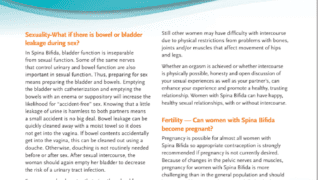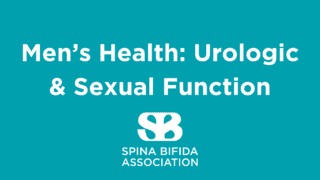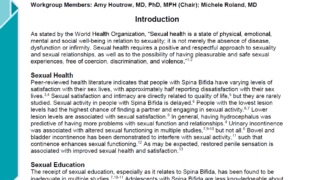Watch the webinar in full here!
Have you ever wondered if it’s possible for a woman with Spina Bifida to become pregnant? Do you wonder how to hold a baby (or chase a toddler!) if you use a wheelchair or other mobility devices?
This SB-YOU webinar discusses the health and medical aspects of conception and managing a high-risk pregnancy, reviews how to get the health and emotional support you need during pregnancy, and presents tips and suggestions for managing life with a baby or toddler.
About the Presenters
Linda Long-Bellil, Ph.D., J.D. @Commonwealth Medicine – University of Massachusetts Medical School
Linda Long-Bellil, PhD, JD, is an Assistant Professor in Family Medicine and Community Health at University of Massachusetts Medical School/Commonwealth Medicine. She conducts research and policy analysis on issues related to health care, including reproductive health care of women with disabilities, and long-term services and supports. She also teaches in the Shriver Center’s Leadership Education in Neurodevelopmental and Related Disabilities (LEND) program and educates current and future health professionals about providing quality care to people with disabilities.
Courtney Shepard Streur – MD, MS @University of Michigan
Women with any disability deserve the same access to reproductive health education and care as women without disabilities. As a pediatric urologist, Courtney evaluates the needs and gaps in providing young women with Spina Bifida (SB) the sexual and reproductive health education and care they desire. Research has shown that only about 5% of young women with SB have ever discussed this topic with a provider, despite nearly 50% being sexually active. The use of gynecologic services and contraception is low in young women with disabilities, but a recent study shows that over 25% of pregnancies among women with SB occur by age 22. This finding indicates that these women may be at increased risk of undiagnosed and untreated STDs, unintended pregnancy, and future unrecognized cervical cancer. By equipping providers with the training and tools to provide sexual and reproductive health education and care to young women with SB, these women can finally get the care they both need and desire.
Becoming a Parent with Spina Bifida
Recordings and Resources
- Watch the webinar here!
- Disabled Parenting Project
- National Research Center for Parents with Disabilities
- The Association for Successful Parenting
- AbleData - A database for information on products, solutions and resources to improve productivity and ease life’s tasks.
- Through the Looking Glass - Information for families in which a child, parent or grandparent has a disability or medical issue.
- Rocking the Cradle: Ensuring the Rights of Parents with Disabilities and Their Children
- What to Expect series for expecting parents
- The Disabled Woman's Guide to Pregnancy and Birth



